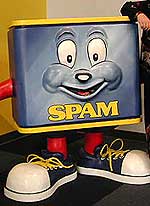By Laurel Druley
Minnesota Public Radio
June 12, 2002
Hormel Foods is getting ready for the grand opening of its SPAM Museum in Austin, Minn. While SPAM has been a household word for decades, other Hormel brands have since emerged and become successful. Economists say Hormel is ahead of the marketing game. And industry analysts say a lot of Hormel's success is due to development of brands that are known worldwide.
| |
|
|
|
||
People all over the world are familiar with SPAM. In Australia it's barbecued. In Hawaii, SPAM sushi is popular. In Korea, it's fixed with kimchi - fermented and preserved vegetables. In Great Britain, SPAM fritters are a staple at fish and chips shops.
SPAM holds an uncanny fascination for some. This is the lunch meat that inspired Monty Python to song. Now, it's pulling people to Austin.
Christopher Pilla, 21, and a friend are driving from New Jersey to California to see the country. They made an unscheduled stop in Austin when they saw a billboard on Interstate 90 advertising the SPAM Museum. The blue and yellow sign reads, "Find out what's inside." Pilla was compelled to stop.
"To be honest, I think a lot of people find it repulsive. So it's kind of a joke. SPAM - it's funny because it's gross," says Pilla. "But I don't think a lot of people know what it is. I used to think it was bad for you, but now looking at a list of the ingredients I was actually thinking maybe it's not as bad as I thought it was."
SPAM is made from pork shoulder, ham, spices, sugar and preservatives.
| |
|
|
|
||
The museum opened last September. But the grand opening was postponed after the Sept. 11 terrorist attacks.
Visitors are led by "SPAMbassadors," who point out historic photographs and SPAM artifacts. Visitors can also watch tapes of SPAM cooking shows, and listen to old jingles.
Shawn Radford, the museum manager, points out one of her favorite exhibits, where - as promised - visitors can find out what's inside.
"So when you walk into our SPAM can here - you see the outside of the can, but as you walk a little further you see the inside of the actual piece of SPAM," she says.
Radford says SPAM is sold in 41 countries, but it's most popular in Hawaii and Guam.
"We actually make particular can just for Guam, that's called hot and spicy. We do have a hot and spicy can that's sold in the U.S. However, hot and spicy made for Guam is really hot and really spicy," says Radford. "In the Philippines, they like a round can. And I think that's what it's about - catering to what your consumers are looking for."
SPAM isn't Hormel's only product. Hormel now calls itself a food company rather than a meat producer. One of the last exhibits in the museum looks like a small grocery store. But the shelves are all stocked with Hormel products. There's SPAM of course, but also olive oil, salsa and frozen food entrees.
Brian Buhr, a livestock marketing economist, says Hormel has led the way in product development and marketing.
|
"They (Hormel) spend about $14 million a year in product development, which is pretty unique for a meat packing company."
- Livestock marketing economist Brian Buhr |
"Hormel, Always Tender, American Classics, Black Label, Chi Chis, Cure 81 Hams ... they spend about $14 million a year in product development, which is pretty unique for a meat packing company," says Buhr.
The industry is spending more money on prepackaged fresh meat in attempts to reverse a decline in red meat consumption.
The red meat slump started when women entered the workforce, and they no longer had a lot of time to cook a beef roast. So Hormel developed microwaveable fresh meat. It's injected with a solution of salt, sugar and vinegar that keeps it moist.
Other companies sell prepackaged steaks, chops and roasts. But economist Brian Buhr says Hormel is still leading the pack.
"They - hands-down - beat any other meat processor out there, other than Smithfield, if you look at stock prices. If you look at their internal returns, they're very strong," says Buhr.
Strong, despite the fact that Spam is also used by many as a derogatory term for junk e-mail. Hormel has never approved of this use of the word, and it's not mentioned in the museum.
Hormel's SPAM Jam kicks off Saturday and features TV stars Barbara Billingsley, Marion Ross, and NBC news anchor Tom Brokaw.
More Information

